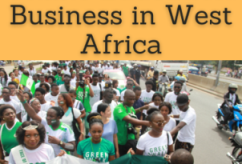Economic Community of West Africa ECOWAS
Free Trade Area Economic Community of West African States (ECOWAS)
The Economic Community of West African States is the most populous regional economic community in Africa.
The Economic Community of West African States (ECOWAS CEDEAO) is a regional African trade bloc founded in 1975.
The members of the Economic Community of West African States are Benin, Cape Verde, Ivory Coast, Gambia, Ghana, Guinea, Guinea-Bissau, Liberia, Nigeria, Senegal, Sierra Leone, and Togo.
In January 2025, Burkina Faso, Mali, and Niger left the Economic Community of West African States (ECOWAS).


- Introduction to ECOWAS
- Institutions of the Economic Community of West African States
- ECOWAS Commission
- ECOWAS Parliament
- Community Court of Justice
- Free Trade Area and Customs Union of the Economic Community of West African States
- ECOWAS Common External Tariff (CET)
- ECOWAS Trade Liberalization Scheme (ETLS)
- Protocol relating to the definition of concept of products originating from the Member States of the Economic Community of West African States
- Protocol on Free Movement of Persons, Right of Residence and Establishment
- Protocol for re-export within the Economic Community of West African States imported goods from third countries
- Socio-economic Context of the West African Region: Benin, Burkina Faso, Cape Verde, Ivory Coast, the Gambia, Ghana, Guinea, Guinea-Bissau, Liberia, Mali, Niger, Nigeria, Senegal, Sierra Leone, and Togo
- The withdrawal of Burkina Faso, Mali and Niger from ECOWAS
- Challenges of the West African region
- West African Common Industrial Policy (WACIP)
- ECOWAS Regional Agricultural Investment Programme
- Transport Facilitation Project
- Convention Relating to Interstates Road Transit for Goods
- EPA Development Programme
- ECOWAS Trade Opportunities Management System
- ECOWAS Regional Road Transport and Transit Facilitation Programme
- Affiliated bodies
- West African Monetary Institute (WAMI) - ECOWAS/WAEMU
- ECOBANK
- West African Development Bank (WADB/BOAD)
- Cauris Management (private equity fund manager)
- West African Private Guarantee Fund (GARI) - WAEMU/ECOWAS
- West African Society for Asset Management (SOAGA)
- ECOWAS Bank for Investment and Development (EBID)
- Case Study:
- ASKY
- African Biofuel and Renewable Energy Company ABREC
- West African Power Pool (WAPP)
- Intergovernmental Action Group against Money Laundering and Terrorism Financing in West Africa (GIABA)
- Religions in the West Africa region
Sample - Economic Community of West African States (ECOWAS):
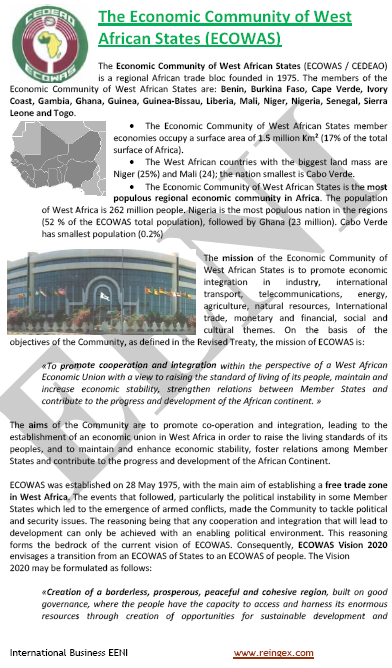

Religions and Global Business -
Religious diversity
The purposes of the subject “Economic Community of West African States (ECOWAS)” are:
- To understand the goals, functions, and the affiliated institutions of the Economic Community of West African States
- To assess the benefits for the member countries of ECOWAS and cooperation areas
- To know ocio-economic development of the West African region
- To research economic and trade integration process among ECOWAS member countries
- To understand the Free Trade Area and customs union of the Economic Community of the West African States (ECOWAS)
- To explore Trade Facilitation and Liberalization in ECOWAS economic space
- Analyze the causes and effects of the withdrawal of Burkina Faso, Mali, and Niger from ECOWAS
- To analyze the role of ECOWAS affiliated institutions: IMAO, ECOBANK, and BOAD

The Subject “Economic Community of West African States (ECOWAS)” is included within the curriculum of the following academic programs at EENI Global Business School:
Master in Business in Africa, International Business.

Doctorate in African Business.

Languages:  or
or  Communauté Économique des États Afrique de l’Ouest CEDEAO
Communauté Économique des États Afrique de l’Ouest CEDEAO  Comunidade Económica Estados África Ocidental
Comunidade Económica Estados África Ocidental  Comunidad Económica de Estados del África Occidental.
Comunidad Económica de Estados del África Occidental.
- Subject Credits “Economic Community of West African States (ECOWAS)”: 2


Guinea was suspended following the military coup in September 2021.
In 2017, Morocco applied to ECOWAS.
The mission of ECOWAS is to promote economic integration in industry, international transport, telecommunications, energy, agriculture, natural resources, International Trade, monetary and financial, social, and cultural themes.
- ECOWAS member economies occupy an area of 1.5 million km² (17% of the total area of Africa)
- The West African Countries with the biggest land mass are Niger (25%) and Mali (24); the smallest nation is Cape Verde
- The population of West Africa is 262 million people
- Nigeria is the most populous nation in the region (52% of ECOWAS total population), followed by Ghana (23 million)
- Cape Verde has the smallest population (0.2%)
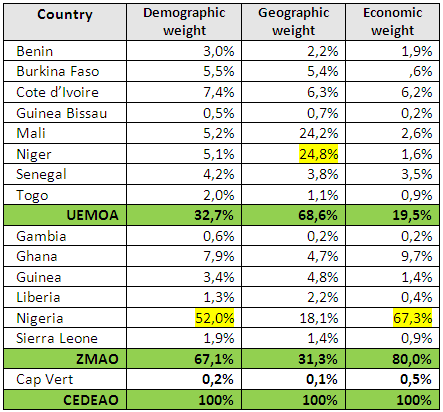
In ECOWAS exist another economic sub-bloc:
The West African Economic and Monetary Union (WAEMU) formed by Benin, Burkina Faso, Ivory Coast, Guinea-Bissau, Mali, Niger, Senegal, and Togo.
The West African Monetary Zone (WAMZ) is a Monetary and Customs Union with a common currency, the CFA Franc.
- The seven remaining countries in ECOWAS have each their national currencies
- ECOWAS is working to resolve a possible conflict with other existing customs union in the West Africa region: The West African Economic and Monetary Union - by adopting Union's tariff band
- ECOWAS has signed a protocol on free movement and trade with the Mano River Union
- ECOWAS has a bilateral trade agreement with Mauritania
- The Economic Community of West African States Commission (ECOWAS) and ECOWAS Bank for Investment and Development are its two main institutions intended to implement policies and carry out development project
Institutions of the Economic Community of the West African State (ECOWAS):
- Commission
- Community Parliament
- Community Court of Justice
- ECOWAS Bank for Investment and Development
The West African Monetary Agency is an autonomous specialized agency of the Economic Community of West African States.
The West African Monetary Institute established under the Agreement of the West African Monetary Zone should perform its functions and carry out its activities in agreement with WAMZ treaty.
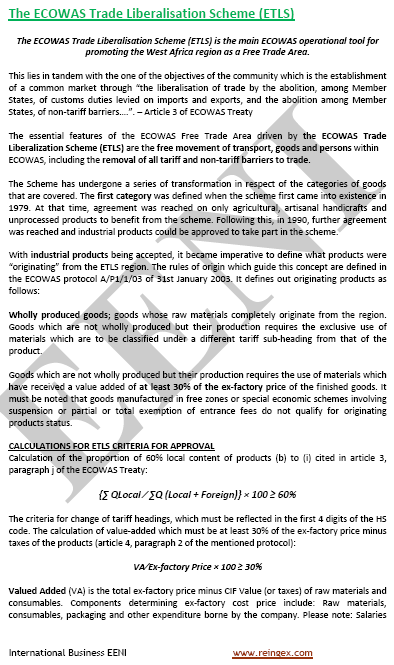
Largest ports in ECOWAS region: Tema, Cotonou, Lomé, Lagos, Abidjan, and Dakar.
Trans-African Corridors in ECOWAS region:
- Trans-Sahelian Highway
- Algiers-Lagos Logistics Corridor
- Cairo-Dakar Logistics Corridor
- Tripoli-Windhoek
- Lagos-Mombasa Logistics Corridor
ECOWAS belongs to the West African Economic Area.
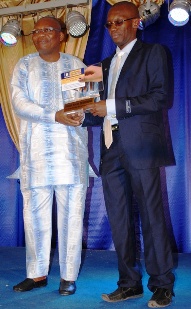
Ouandaogo Abdoul Karim (Student of the Master in International Business University of Ouagadougou &
EENI) winner of a WAEMU regional award.

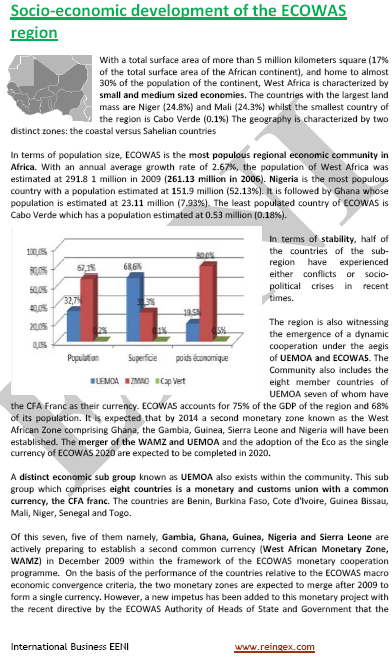
(c) EENI Global Business School (1995-2025)
Top of this page







 WhatsApp
WhatsApp